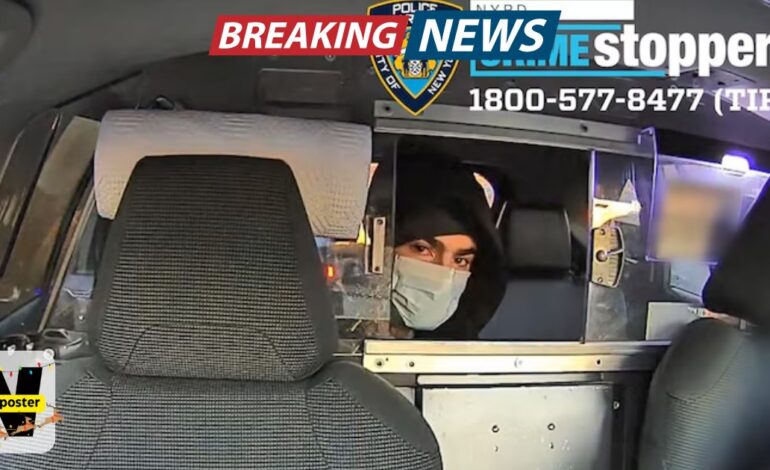Daniel Penny Found Not Guilty of Criminally Negligent Homicide in Subway Chokehold Trial: Jury Reaches Verdict in Controversial Case Involving the Death of Jordan Neely
In a case that has captivated the attention of the nation, Daniel Penny, a 26-year-old former Marine, was found not guilty of criminally negligent homicide in the death of Jordan Neely, a 30-year-old homeless man, who died following a chokehold during a confrontation on a New York City subway train in May 2023. The verdict, delivered by a jury on Monday after more than 24 hours of deliberations spanning five days, marks the conclusion of a trial that raised complex questions about self-defense, police authority, and the treatment of people with mental health challenges.
The case has ignited passionate debates and protests, with some viewing Penny’s actions as a necessary response to an unpredictable and aggressive individual, while others argue that Neely’s death was an unjustified and excessive use of force. The trial brought to the forefront broader conversations about issues of race, public safety, and the use of force in confrontational situations.
Penny was originally charged with second-degree manslaughter, a felony that carries a potential sentence of up to 15 years in prison. However, during the trial, Judge Maxwell Wiley dismissed the manslaughter charge on Friday after prosecutors requested it, citing insufficient evidence to support the more severe charge. The jury was then instructed to deliberate on the lesser charge of criminally negligent homicide, which carries a maximum sentence of four years in prison.
The Incident:
The fatal confrontation occurred on the afternoon of May 1, 2023, aboard a subway train in Manhattan. Neely, who had a history of mental health issues and was known to be homeless, boarded the train and reportedly began acting erratically. Witnesses stated that Neely was shouting, making disturbing comments, and threatening passengers. According to some accounts, Neely claimed he was hungry and thirsty, and he also reportedly said he was ready to fight anyone on the train.
As the train entered the Broadway-Lafayette station, Penny, who was riding the subway to work at the time, confronted Neely. Penny, who had experience in military training, intervened, placing Neely in a chokehold to restrain him. Witnesses recalled that Penny held Neely in the chokehold for several minutes, and Neely lost consciousness during the struggle. Despite the attempts of other passengers to intervene and call for help, Neely was unresponsive by the time the train arrived at the station.
Emergency responders arrived soon after the train reached the station, but Neely was pronounced dead at the hospital shortly thereafter. The cause of death was later determined to be positional asphyxiation due to the prolonged chokehold.
The Trial:
The trial centered on whether Penny acted within his rights to defend himself and others from a perceived threat or whether his actions were an excessive and unjustified use of force that led directly to Neely’s death. The prosecution argued that Penny’s chokehold was excessive, particularly given Neely’s vulnerability, and that he continued to restrain Neely for far longer than necessary, even as it became clear that Neely was no longer able to defend himself.
Prosecution’s Argument:
Prosecutors, led by Assistant District Attorney Daniel Alonzo, contended that Penny’s actions were reckless and amounted to criminally negligent homicide. They argued that while Penny may have initially acted in a moment of fear, he failed to recognize when Neely had become unconscious and ceased to be a threat. Prosecutors pointed out that Neely had not physically attacked Penny or anyone else and was merely acting out in a way that many would consider erratic, but not violent. They emphasized that the chokehold lasted several minutes and was not stopped until after Neely stopped moving.
Prosecutor Alonzo also argued that Penny’s military background should have made him more aware of the dangers of placing someone in a chokehold and that he should have known the risks of asphyxiation. In their closing arguments, the prosecution accused Penny of holding Neely “way too long” and failing to act with the proper awareness of Neely’s medical and mental state.
Defense’s Argument:
The defense, led by attorney Steven Raiser, presented a starkly different interpretation of the events. Raiser argued that Penny acted out of concern for the safety of the other passengers, who were reportedly frightened by Neely’s behavior. Raiser suggested that Neely’s erratic and aggressive actions, including threats and shouting, created a dangerous environment in which Penny and others felt physically threatened.
Raiser further claimed that Penny, who had military training in combat and self-defense tactics, was attempting to subdue Neely temporarily until police could arrive. According to the defense, Penny held Neely in the chokehold out of fear that Neely would escape or escalate the situation further. Raiser also argued that Penny stopped holding Neely as soon as he became unresponsive and that no ill intent was involved. The defense maintained that Penny’s actions were a necessary response to an unpredictable and aggressive individual.
The Jury’s Deliberation:
After five days of testimony and deliberations, the jury returned a verdict of not guilty on the charge of criminally negligent homicide. The jury was reportedly deadlocked for several hours on the more serious second-degree manslaughter charge, but after careful consideration, they concluded that the evidence did not support that charge. Following the dismissal of the manslaughter charge by Judge Wiley, the jury focused their attention on the lesser charge of criminally negligent homicide, ultimately deciding that Penny’s actions did not rise to the level of criminal negligence.
The jury’s decision has sparked strong reactions from both sides. Supporters of Penny’s acquittal argue that the former Marine acted out of an obligation to protect others and did not intend to cause harm. They view the verdict as a win for self-defense and public safety. On the other hand, advocates for Neely’s family and supporters of the prosecution contend that the jury’s decision was a failure to hold Penny accountable for a reckless and preventable death.
The Aftermath: Protests and Community Reactions
The verdict was met with immediate protests outside the courthouse and in several major cities across the United States. Demonstrators rallied in support of Neely, calling for justice and highlighting the racial and systemic issues surrounding the treatment of homeless individuals, particularly those with mental health challenges. Some activists expressed outrage that Penny was not held accountable for what they considered an unjustified killing, while others decried the broader issues of police violence and the criminal justice system.
Meanwhile, supporters of Penny, including some of his fellow veterans and individuals who view his actions as justified, rallied in his defense. They argued that the jury’s decision was a reflection of a fair and balanced judicial process, and that Penny had been unjustly vilified by the media and activists. Some expressed frustration at what they viewed as an unfair public narrative that painted Penny as a villain.
The Legal and Social Implications
The trial and its outcome have raised critical questions about the use of force in situations involving mentally ill or homeless individuals. Many have pointed to the role of public transportation systems in managing such situations and whether passengers or bystanders should be expected to intervene in confrontational situations. Additionally, the case has raised concerns about the training and protocols for handling individuals exhibiting signs of mental illness or erratic behavior in public spaces.
The case also brought attention to the racial dynamics involved, with Neely, a Black man, and Penny, a white man, at the center of the controversy. The question of whether racial bias played a role in the response to Neely’s behavior and the public’s perception of the incident remains a topic of discussion.
In the aftermath of the trial, experts and community leaders have called for reforms in both public safety and mental health care. There is a growing recognition that incidents like this reflect broader systemic issues that need to be addressed through changes in policy, public attitudes, and support services for individuals experiencing homelessness or mental health crises.
Conclusion: A Divisive Verdict
The trial of Daniel Penny for the death of Jordan Neely has left the nation divided, with strong opinions on both sides of the issue. The not guilty verdict on criminally negligent homicide reflects the complexity of the case, but it also underscores the broader societal debates around the use of force, the treatment of vulnerable populations, and the responsibilities of individuals to intervene in dangerous situations.
While Daniel Penny may have been acquitted of criminal charges, the questions surrounding the case—about accountability, justice, and the value of human life—are far from settled. The legacy of Jordan Neely’s death, and the trial that followed, will continue to shape discussions about public safety, mental health, and race in America for years to come.



